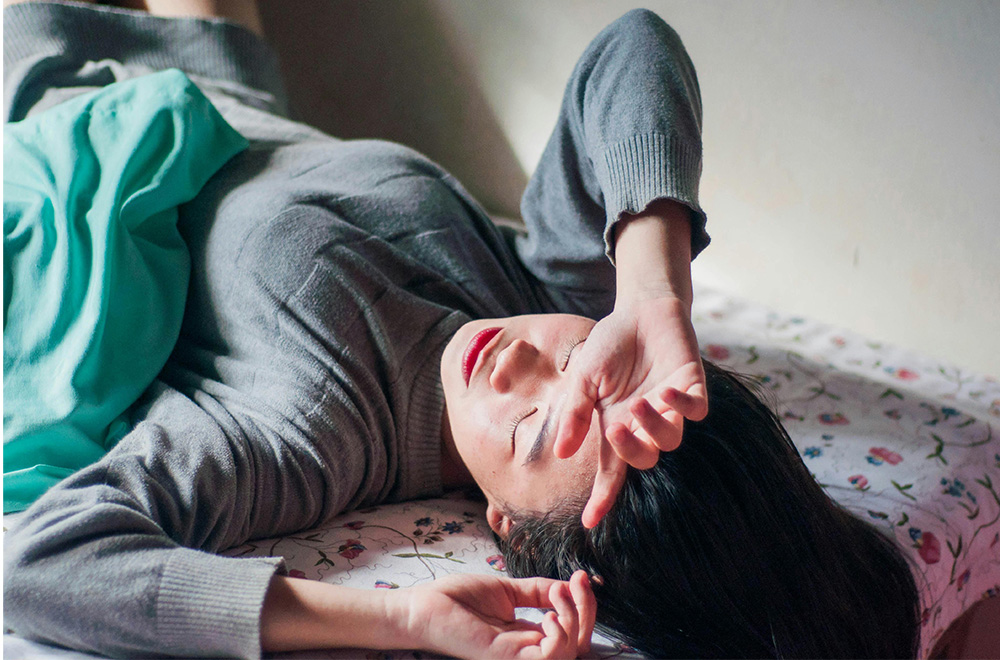Having a good night’s sleep can be important for everyone. Research suggests that getting good sleep, and dreaming, can help our brains create meaning from the day’s experiences, and help strengthen memories.
Are there links between epilepsy and sleep?
The links between epilepsy and sleep are very complex. For some people a lack of sleep can make seizures more likely to happen, for others having seizures at night can make them feel tired during the day.
Sleep disorders, such as insomnia (difficulty falling asleep) and obstructive sleep apnoea (OSA) can affect epilepsy, and epilepsy can also affect sleep disorders (see below).
During sleep the brain is active, processing information to help us to learn. Brain activity changes during the different stages of sleep.
Different stages of sleep
Sleep happens in an alternating pattern, divided into two different categories of sleep type:
- non-rapid eye movement (NREM), which is light and deep sleep, and is split into 3 stages; and
- rapid eye movement (REM) sleep.
Non-rapid eye movement sleep
Light sleep
- Stage one - during this first stage of NREM sleep, our muscles start to relax, we are half awake and half asleep and can easily be woken up.
- Stage two - during this second stage, our heart rate and breathing slow down and seizures can be more likely to happen for some people with epilepsy as we go from this stage to stage three, deep sleep.
Deep sleep
- Stage three is deep sleep (sometimes called slow-wave sleep). Our breathing and heart rate slows and our brain begins to produce ‘delta waves’, a type of electrical activity associated with deep sleep. Delta waves increase as sleep gets deeper and it is difficult to be woken. If we are woken during this stage we will often be confused. Sleep walking and night terrors are more likely to happen during deep sleep than during light sleep.
Scientists believe that NREM sleep is important for strengthening connections between our brain cells and stabilising long-term memories. Deep sleep also helps the brain to recover from the day's events so that it can function well the next day.
Rapid eye movement sleep
The next stage of deep sleep is when most dreaming occurs. During REM sleep the brain tries to organise the information we have received throughout the day.
The purpose of REM sleep and dreaming is unclear. However some theories suggest it may be important for making sense of our thoughts, ideas and experiences, and the emotions and memories attached to them.
A lack of sleep can affect our memory and judgement. It can also affect our mood and how well our immune system works.
Are there links between seizures and sleep?
Some people have specific triggers for their seizures, for example a lack of sleep and some seizures occur from sleep only. In some types of epilepsy, seizures can happen as someone is waking up and within the next few hours. People with epilepsy may have an irregular sleep pattern, as seizures at any time of the night can disrupt sleep, and seizures during the day can affect the next night’s sleep. For some people the effects of having a seizure can upset their sleep pattern for several days afterwards.
Do anti-seizure medications affect sleep?
As with all medications, anti-seizure medication (ASM) can cause side effects for some people. ASMs may have different effects on sleep, and this can vary from person to person, depending on the dose. Some ASMs are classed as sedatives and can cause tiredness. Some can cause insomnia or disrupted sleep. However some ASMs can help to improve the quality of sleep by increasing the length of deep sleep.
Seizures that start during sleep
Some people with epilepsy have sleep related seizures (sometimes called ‘ asleep seizures’), that happen when they are asleep, as they are falling asleep, or as they are waking up. Frontal lobe epilepsy is a type of epilepsy where seizures can commonly happen during periods of NREM sleep as well as when awake. Frontal lobe seizures often happen in ‘clusters’ (many happening close together in time), but are usually brief. They can include sudden jerking movements, strange postures, or movements of the arms or legs, loud cries or screams and wandering about during sleep.
Sleep disorders
Some sleep disorders are called ‘parasomnias’: unusual events that are linked to sleep. These can include confused behaviour during sleep, sleepwalking, or night terrors (where a person suddenly wakes from sleep in a state of panic or fright). This may happen when some parts of the brain are awake and others are asleep. Some parasomnias include making unusual movements or sounds. Sometimes it can be difficult to tell whether someone is having seizures or if what happens to them is part of a parasomnia. It can be helpful to keep a record or video recording of what happens during the event to help with diagnosis. Seizures often follow a similar pattern each time they happen and it may be clear to see when a seizure starts and when it stops. However, parasomnias do not necessarily follow a pattern and often have no clear end.
Some symptoms of narcolepsy (a rare condition causing uncontrollable urges to fall asleep, which also disrupts overnight sleep) are sometimes mistaken for epilepsy. For example, some people with narcolepsy develop cataplexy, a loss of muscle tone often affecting the jaw, neck and limbs. Symptoms can also include slurred speech or blurred vision. Some people may collapse, but people do not lose consciousness during cataplexy attacks. An episode of cataplexy is triggered by emotions such as laughter, anger, or surprise. Visit narcolepsy.org.uk for more information.
Epilepsy and sleep disorders
Some people with epilepsy also have sleep disorders that are not related to their epilepsy, and some medical conditions can be confused with epilepsy. Obstructive sleep apnoea (OSA), where a person snores and then stops breathing for short periods during sleep, can be more common in people with epilepsy. It is sometimes caused by low muscle tone around the airway. This may happen as a result of weight gain, which can be a side effect of some ASMs. As well as disrupting sleep, obstructive sleep apnoea can worsen seizures for some people.
If you snore and are told that you stop breathing during sleep, your GP can arrange for you to have a simple, pain free test to monitor oxygen levels in your blood overnight, to help diagnose obstructive sleep apnoea. Visit sleep-apnoea-trust.org for more information.
Tips for getting good sleep
There may be some simple things you can do to help you to get a good night’s sleep.
• Try to have more regular sleep times. It is probably more important to have a fixed time of getting up in the morning than a fixed bedtime, to avoid going to bed when you are not sleepy as this may make it more difficult to fall asleep.
• Try to reduce distraction and avoid disturbance during the night by switching off your mobile devices and keeping them outside the bedroom. This is because phones and tablets can be very distracting even when turned off.
• It is better to use a regular alarm clock to check the time and for waking you up, rather than a mobile.
• Avoid alcohol in the four hours before going to bed. Even though alcohol may make it easier to fall asleep, the effect will wear off during the night making it more difficult to stay asleep. This can lead to disrupted overnight sleep and early waking up.
• Avoid caffeine after 2pm. Remember that this also includes many soft drinks and chocolate as well as tea and coffee.
• Try to keep active in the day and get as much daylight as you can. Exercise regularly, but not just before bedtime. Strenuous exercise within two hours of going to bed may make it more difficult to fall asleep. The benefit of exercise may take some time to kick in and may not be apparent until after some months.
• Try to establish a bedtime routine such as a warm bath or a few minutes reading but avoid watching television in bed.
• Practise relaxation techniques before bed such as gentle breathing exercises or progressive muscle relaxation (gradually tensing and then relaxing all your muscles, beginning with your feet and working your way up through the whole of your body). You may find that relaxation tapes, meditation, or yoga help you to relax before sleeping.
• Avoid napping during the day. Sleeping a lot during the day will affect your ability to go to sleep at night. If you do need a nap, try to limit it to 15 minutes. This should prevent you going into deep sleep from which it is usually more difficult to wake up.
If you have problems with sleep, ask your GP or consultant can refer you to a specialist sleep clinic.
Epilepsy Society is grateful to Dr Sofia Eriksson, consultant neurologist and clinical lead for epilepsy and sleep neurology at National Hospital for Neurology and Neurosurgery, who reviewed this information.
Information updated: February 2025. Review date: February 2027.
Download this information
For a printed copy contact our Helpline.
Epileptic seizures
There are many different types of epileptic seizure. Any of us could potentially have a single epileptic seizure at some point in our lives. This is not the same as having epilepsy, which is a tendency to have seizures that start in the brain.
Seizure triggers
For some people, certain situations can trigger (set off) a seizure. Common triggers include lack of sleep, stress, alcohol, and not taking their prescribed anti-seizure medication (ASM).
What is epilepsy?
Epilepsy varies greatly and affects everyone differently. If you or someone you know has epilepsy, you may find it helpful to learn more. Here are some basic facts about epilepsy and where to get more information.




